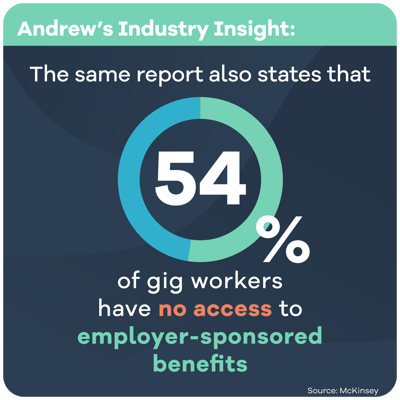In recent years, the gig economy has reshaped the way many individuals work and earn their livelihoods. Characterized by short-term contracts, freelancing, and on-demand tasks, the gig economy offers workers a level of flexibility that traditional employment often cannot match. This flexibility comes at a price, and it raises a fundamental question: can gig workers find a balance between flexibility and worker protections, and should they consider unionizing to achieve this balance?
Advantages of Gig Work: Flexibility at Your Fingertips
One of the advantages of gig work is the incredible flexibility it offers. Gig workers have the freedom to set their own schedules, theoretically working whenever it suits them.
Andrew’s industry Insight: According to a report by McKinsey, by 2025, up to 162 million people in the United States and Europe could be engaged in some form of independent gig work. This figure highlights the growing significance of the gig economy in the job market.

This flexibility is particularly evident in ride-sharing services like Uber and Lyft, where drivers can log in and out as they please, as long as it's financially viable.
Additionally, gig work allows individuals to directly translate effort into earnings. Unlike traditional hourly jobs, where shifts are assigned, gig workers can determine how much they want to work and how much they want to earn. This is incredibly different from my time in the foodservice industry where I received a schedule of set hours a couple weeks in advance. If I wanted to work more or less, this was incredibly difficult to do, especially in the case of emergencies.
Moreover, gig platforms often offer incentives, such as bonuses for working during peak times or completing a series of tasks in a set timeframe. This allows gig workers to boost their income by aligning their efforts with the platform's promotions.
The Drawbacks: The Double-Edged Sword of Flexibility
While gig work provides valuable flexibility, it's not without its challenges. Like the robber baron railroad owners of yesteryear, the owners of gig economy infrastructure hold considerable market power, with only a few dominant players in most sectors. Statista data indicates that Uber and Lyft dominate the U.S. ride-sharing market, with a combined market share of over 70%. This concentration of power underscores the influence these companies have over gig workers.
This lack of competition can limit options for gig workers and reduce the perceived flexibility. These companies often incentivize drivers to be available as much as possible, impacting the true extent of their flexibility.
One significant drawback of gig work is the lack of stability and income reliability. Gig workers don't have fixed hours or minimum wages.
Andrew’s industry Insight: The same report also states that 54% of gig workers have no access to employer-sponsored benefits.

This highlights the lack of traditional worker protections in the gig economy.
This instability can lead to income fluctuations, making it challenging for gig workers to plan their finances. The COVID-19 pandemic highlighted the vulnerability of gig workers, as they lacked essential protections like health insurance and unemployment benefits when demand for their services plummeted. According to the Economic Policy Institute, many gig workers were ineligible for traditional unemployment benefits, leaving them financially vulnerable during the crisis.
The Role of Unions in Balancing the Scales
Traditionally, labor unions have played a vital role in protecting workers' rights and negotiating better conditions in various industries. Unions allow employees to collectively bargain for fair wages, job security, benefits, and improved working conditions. However, the gig economy presents unique challenges when it comes to unionization.
In more conventional employment settings, workers at a specific company can exercise their right to unionize, initiating negotiations between the union and the employer. This well-established model has led to tangible improvements in conditions for countless workers. Nevertheless, gig workers, often classified as independent contractors, find themselves facing unique hurdles when attempting to form unions.
Nonetheless, I see a ray of hope for gig workers due to their distinctive advantage: their services are the lifeblood of gig platforms. If a substantial portion of gig workers were to unite and consider unionization, the platforms would be compelled to engage in negotiations to retain their workforce.
The Path Forward: Unionization for Gig Workers
Looking ahead, the question that arises is whether gig workers should indeed contemplate unionization as a strategy to secure enhanced working conditions, job security, and essential benefits. While the outcome of such efforts remains uncertain, there are undeniably compelling reasons for gig workers to explore this avenue.
As the gig economy undergoes constant evolution, with the specter of autonomous vehicles and other technological advancements looming on the horizon, I see the necessity for worker protections becoming more critical than ever. Gig workers, such as those who drive for Uber and Lyft, could potentially negotiate for essential benefits like guaranteed time off, wage reimbursement in times of illness or injury, improved terms for vehicle rentals, and more. These provisions could act as a safety net in an increasingly unpredictable work environment.
The gig economy has undeniably transformed the way people work, offering unprecedented flexibility but also exposing workers to the unsettling specter of financial insecurity. With the gig economy's continual growth and evolution, it is my belief that gig workers should seriously consider unionization as a strategy to protect their rights, safeguard their livelihoods, and strike a balance between the cherished flexibility they enjoy and the worker protections they urgently need. While the path forward may be fraught with challenges, the potential benefits it holds for gig workers and the broader future of work make it a cause truly worth pursuing.
.png?width=56&height=56&name=Duffy-01%20(1).png)



